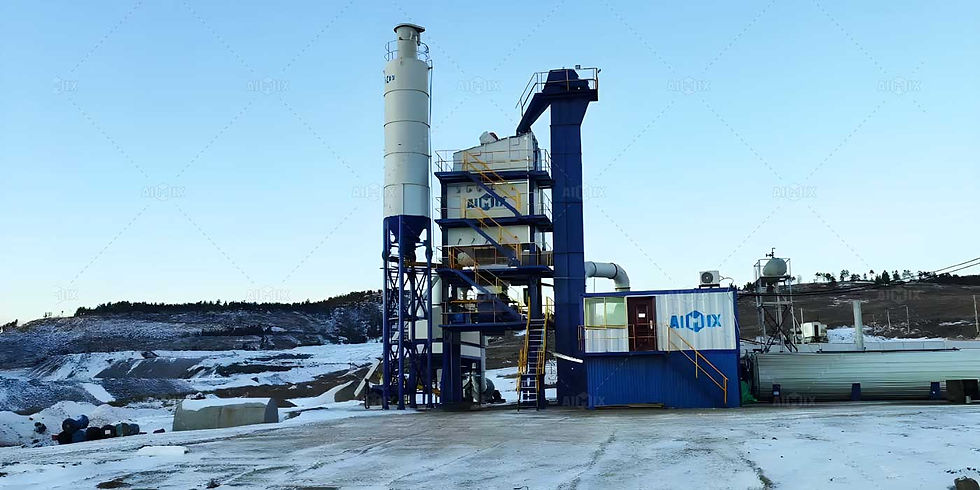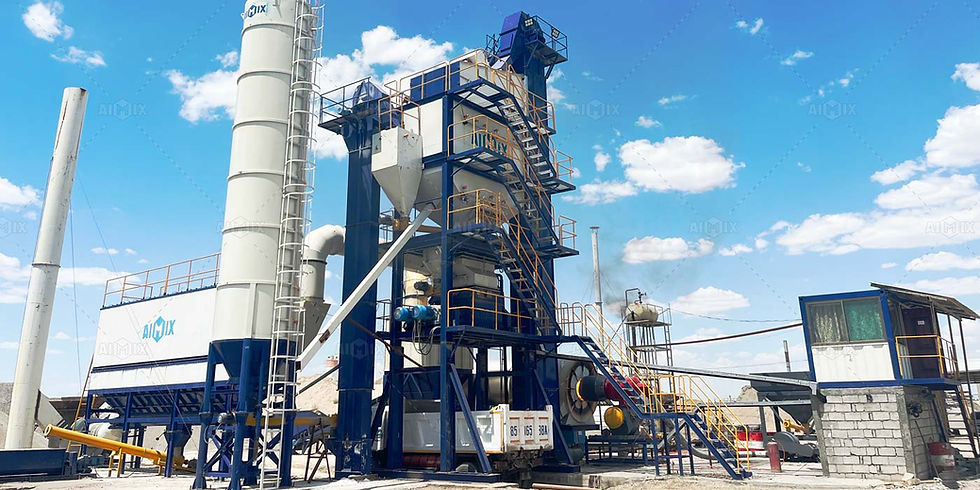How to Expand into Asphalt Mixing Business from Existing Quarry or Crushing Business?
- aimixglobal5
- Apr 27, 2025
- 4 min read
If you already run a quarry or a crushing business, you're sitting on a golden opportunity. Asphalt production is a natural next step. You already have one of the most important raw materials: aggregates. By adding an asphalt mixing plant to your existing operations, you can unlock new revenue streams, serve more clients, and gain better control over pricing and quality. But how do you make the transition effectively? In this article, I’ll walk you through the real steps to help you scale into the asphalt mixing business in a way that makes sense—both operationally and financially.

Why Asphalt Mixing Is a Logical Extension
If you're already supplying crushed stone or aggregates, many of your customers are likely involved in road construction, infrastructure, or commercial site development. These same clients need asphalt. Rather than just being a material supplier, you can become a one-stop solution by producing asphalt mix on-site.
Value Addition and Competitive Edge
Crushing businesses typically have limited margins. Adding an asphalt mixing plant allows you to offer high-value products. You’re no longer just selling raw materials—you’re selling finished goods. This increases your profit margins significantly. It also helps you win contracts that require both materials and mix supply, giving you a clear competitive edge.
Stable Demand from Infrastructure Projects
Asphalt demand is stable—and growing. With government investment in roads, airports, and urban expansion across Southeast Asia, especially in Indonesia, demand for asphalt never really dips. If you're already supplying base layer aggregates, asphalt is the next layer—literally and financially.

What You Need to Start Asphalt Production
Now that you understand the opportunity, let’s look at what you actually need to expand into asphalt mixing. The transition is easier than you think—especially when you already control your raw material supply.
1. Suitable Site and Infrastructure
Since you already run a crushing site, you likely have a large enough yard and good access roads. What you’ll need is flat ground, electricity or fuel setup, and space for storage silos, mixing drums, and bitumen tanks.
2. Choosing the Right Asphalt Mixing Plant
This is the heart of your expansion. There are mainly two types to consider: drum mix plants and batch mix plants. If you're targeting continuous large-scale road projects and need lower cost per ton, a drum mix plant makes sense. If your projects are varied and demand different mix formulas, a batch plant gives you more flexibility.
You can also choose between stationary or mobile plants, depending on your site layout and whether you want to move closer to project locations. Get to know the asphalt plant cost at right!
3. Bitumen Supply and Heating System
Bitumen is the binder in asphalt. Make sure you have reliable bitumen supply contracts. Also, choose a plant with an efficient heating system—whether thermal oil or direct heating—to keep your operations consistent and energy-efficient.
4. Skilled Labor and Training
Even though you're already in aggregates, asphalt mixing requires specific technical knowledge. The good news is: with modern equipment, most systems are semi-automatic or fully automated. We offer local training and support to help your team ramp up quickly.

How to Ensure a Smooth Transition
Adding asphalt production can feel like a big step. But with the right approach, it's a manageable and profitable shift.
Start Small, Scale Fast
You don’t have to go all-in on day one. Many customers start with a 40-60 TPH drum plant to serve local contractors. Once demand picks up, scaling up to 80 or 100 TPH is straightforward. We can even help you expand in phases, using modular systems.
Use Existing Logistics Strength
You already have a fleet or partnerships for transporting aggregates. You can leverage the same system to deliver asphalt. This simplifies your logistics and cuts costs.
Build on Existing Customer Base
Reach out to your current customers first. If they’re buying your crushed stone, they’ll likely be happy to get asphalt from you too—especially if you can deliver fast and consistently. You already have their trust. Now you can offer more value.

What to Look for in an Asphalt Plant Supplier
Not all asphalt plants are created equal. Choosing the right supplier is critical for success.
Local Support and Spare Parts
Downtime is expensive. You need an asphalt plant manufacturer with local service teams and warehouses. That way, you can get quick support and parts when needed—without long shipping delays.
Customized Solutions Based on Your Site
No two crushing sites are the same. We offer tailored solutions—mobile or stationary—based on your terrain, layout, and expansion goals.
Full Project Guidance
From layout design to installation and training, we provide full support. Our goal is to help you succeed—not just sell you a machine.
Ready to Grow Beyond Stone? Let’s Talk
Expanding from quarry or crushing into asphalt mixing is more than possible—it’s a smart move in today’s construction landscape. It brings higher margins, deeper customer relationships, and access to bigger contracts. If you're already producing aggregates, you're halfway there.
At our Indonesian branch, we’ve helped dozens of clients make this leap. We offer reliable asphalt mixing plants, local service teams, and full guidance to get your new line running smoothly. Whether you're just exploring or ready to invest, we're here to support your journey.
Let’s talk about how you can add asphalt mixing to your business—and turn your quarry into a more profitable operation.



Comments